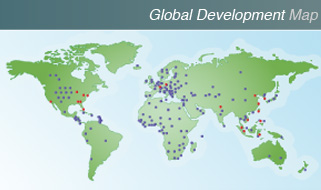- “Progress!”
(Dr. Eva Feldman, MD, Ph.D,FAAN, FANA)
Russell N. DeJong Professor of Neurology
Director, A. Alfred Taubman Medical Research Institute
Director, Program for Neurology Research and Discovery Univ. of Michigan
Posted: June 18, 2013
On Thursday of last week, Dr. Eva Feldman gave the plenary address at the Canadian Neurological Sciences Federation Annual Congress. During the talk she showed 50 slides detailing the long history of our ALS clinical program, discussing the technological issues with surgery into the spinal cord as well as a myriad of issues involved with neural stem cells. In summarizing the trial data to date, she reiterated that the preliminary data showed that patients with a short disease duration prior to surgery and no bulbar symptoms, can show disease stabilization and/or improvement after intraspinal stem cell transplantation (based upon ALSFRS, FVC, EIM, Spasticity/QOL scales).” These conclusions now include data from the three subjects in the trial who received five unilateral cervical injections each. One of the patients in this cohort who had bulbar symptoms died. Five of the six patients who died during the trial (out of fifteen) had bulbar symptoms and died of ALS 7-to-30 months after surgery; one patient died of unrelated heart problems. The two remaining cervical-only injection patients were reported to be in the “stable or improved” category.
- “O brave new world...”
(Miranda, The Tempest Act 5, Scene 1)
Posted: May 22nd, 2013
On Friday last week, Dr. Eva Feldman spoke at a conference in Europe, and presented data from our Phase I ALS trial; data on all 15 patients (18 surgeries as 3 patients came back for a second transplantation) from the beginning of the trial nearly 3 years ago through mid February of 2013, 6 months after the last surgery as required by the FDA.
- "The best thing about the future is that it comes one day at a time"
- Abraham Lincoln
Posted: March 19th, 2013
There is often a disconnect between the urgency one feels in working to find cures for fatal and incurable diseases, and the realistic time frames required for even the best cutting edge science to move from bench to bedside. Stem cell science presents us with such disconnects. It is clear to all involved that yet more urgency and more speed are needed. Yet by traditional standards we are still early in the clinical process, even as we put all of our resources into attempts to accelerate the process. There is however, an area of stem cell science where therapeutic intervention is possible today. In a bit of a departure for this space, I would like to draw your attention to the battle against Leukemia and various blood cancers through the fight for survival of two inspirational patients.
- "You never want a serious crisis to go to waste"
- Rahm Emanuel (attribution)
Posted: February 27th, 2013
As callous and cold hearted as this sounds, it is a political truism. There are some systems, some bureaucracies that are so gridlocked, or so moribund that only the urgency that comes from dealing with a crisis can create enough momentum to make progress. The FDA held a hearing on Monday to allow the ALS community to voice their opinions on how to proceed with ALS research. While it is unclear exactly what precipitated the calling of this hearing, the failure of the Phase III Biogen “dex” trial to treat ALS patients has perhaps, finally created a “crisis” mode at the FDA. The audience was able to assure the FDA that they are already in crisis mode.
- “There's a kind of a sort of : cost
There's a couple of things get: lost”
(Wicked)
Posted February 7, 2013
The FDA has called a public hearing late in February to solicit ideas and opinions on how they should think about, and evaluate clinical trials to treat ALS. The Agency has come under criticism over the past year for not being “supportive” enough of novel treatments for incurable diseases (like ALS) and innovation in general. The FDA has responded basically by stating that supporting innovation is not their mission and that their job is to make sure medicines are safe and actually work. The FDA is (rightly) considered the “gold standard” throughout the world. This reputation as the “toughest” regulatory agency to deal with is a reputation they fight to maintain, and they believe that through such diligence they can best protect the American public.
More Articles...
- Spinal Cord Injury Trial
- A scientific truth does not triumph by convincing its opponents and making them see the light, but rather because its opponents simply die off. Science progresses one funeral at a time.
- "If he was doing badly, he would write."
- “If voting changed anything, they’d make it illegal”
- The first thing we do, let’s kill all the lawyers.






